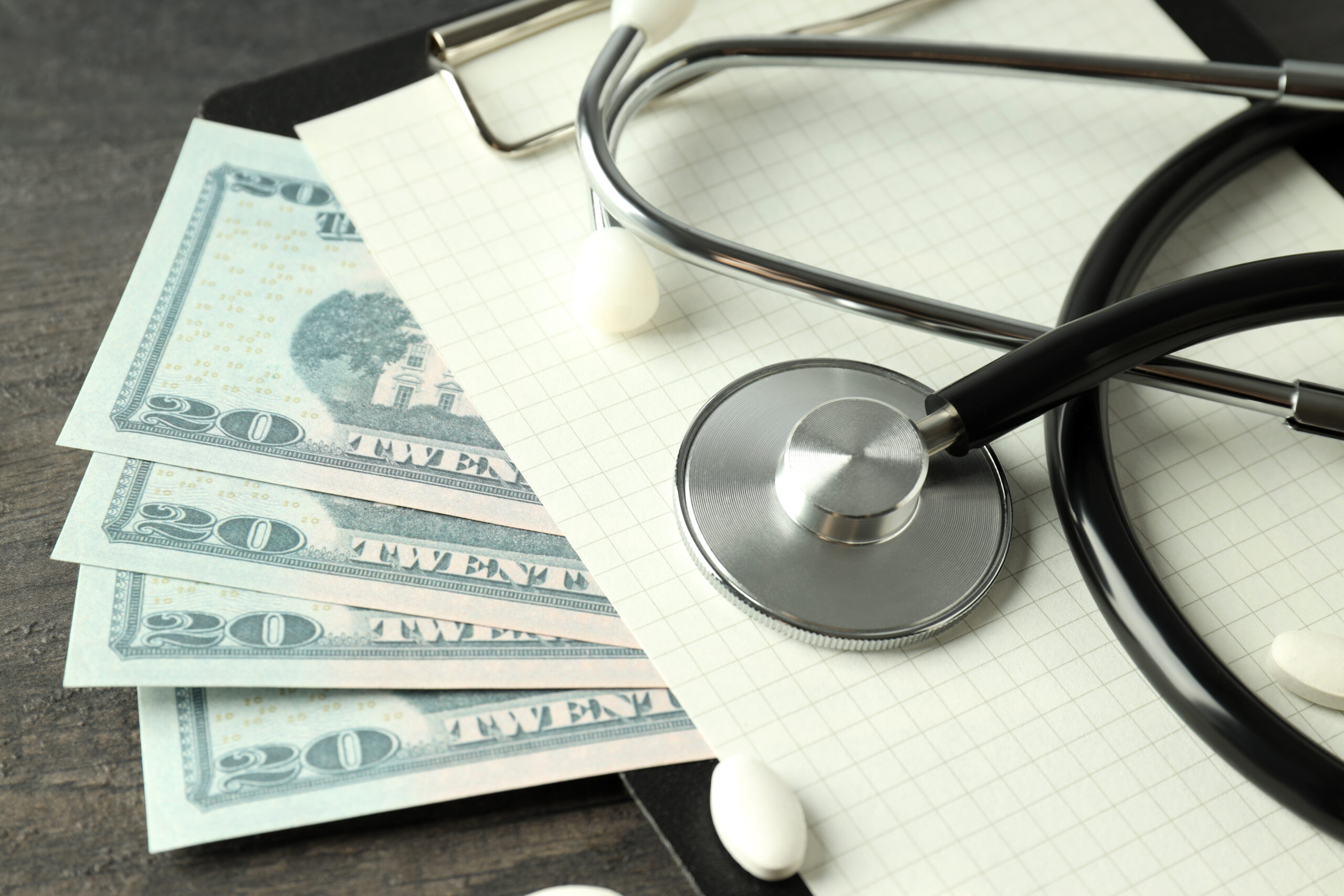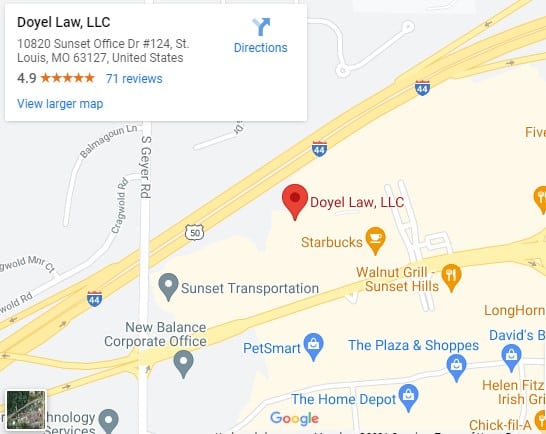Learn The Things You Should Know Before Filing for Bankruptcy
Dealing with money troubles is challenging, especially if you are unsure of filing for bankruptcy. Bankruptcy is a powerful tool that can provide a fresh start, but timing is everything. When making such significant financial decisions, seeking legal guidance is crucial. Doyel Law is ready to assist you with our knowledge and experience in Sunset Hills bankruptcy cases. We will delve into the considerations and shed light on the question: “When should I file for bankruptcy in Sunset Hills, MO?”
Quick Summary:
- Missouri residents file for bankruptcy under Chapter 7 or Chapter 13. Chapter 7 is for liquidation, while Chapter 13 is for restructuring debts.
- Not all debts are discharged, bankruptcy affects credit score, and co-signers may be liable.
- It might be time to file for bankruptcy if you are struggling to make ends meet, multiple bills are overdue, creditors are contacting you, you’ve received a wage garnishment notice, you’re considering withdrawing from retirement savings, and you are feeling overwhelmed by debt.
- If you can’t repay your debts within five years, bankruptcy might be an option.
- Credit counseling, debt consolidation, debt management plan, and debt settlement are alternatives to bankruptcy.
- Before resorting to bankruptcy, consider reaching an agreement with creditors, contacting your loan servicer, negotiating with creditors, using a debt management plan, or employing budgeting and financial planning strategies.
At Doyel Law, we understand the complexities of bankruptcy proceedings and are dedicated to helping individuals achieve financial peace of mind. Our experienced attorneys will guide you through the entire process, ensuring that your rights are protected and that you make the best decisions for your financial future. Don’t hesitate to contact us today for a consultation.
What are the Bankruptcy Types in Missouri?
In Missouri, individuals and businesses typically file for bankruptcy under two main chapters of the U.S. Bankruptcy Code: Chapter 7 and Chapter 13.
Chapter 7 Bankruptcy
- Also known as “liquidation” or “straight bankruptcy.”
- Involves the sale of non-exempt assets to pay off creditors.
- Individuals, partnerships, and businesses can file for Chapter 7.
- Eligibility is determined by a means test, which compares the debtor’s income to the state’s median income.
Chapter 13 Bankruptcy
- Involves creating a repayment plan to pay off debts over a specified period (usually three to five years).
- Individuals with a regular income can file for Chapter 13.
- Allows debtors to keep their assets while restructuring their debts.
- Often used to prevent foreclosure on a home or repossession of a car.
Missouri has specific exemptions that determine which assets individuals can keep during bankruptcy. These exemptions protect certain types and amounts of property from being included in the bankruptcy estate.
What are Missouri’s Bankruptcy Exemptions?
Missouri bankruptcy exemptions are designed to protect certain assets from creditors, allowing individuals to keep some of their property even after filing for bankruptcy. These exemptions are specific to Missouri and differ from the federal exemptions.
Homestead Exemption
The homestead exemption protects the equity in a debtor’s primary residence. That means a debtor can keep their home, even if they owe more on their mortgage than the home is worth. The amount of equity that can be exempted depends on the filing status of the debtor.
- Single head of household: Up to $20,000
- Married couple filing jointly: Up to $40,000
Personal Property Exemptions
Personal property exemptions protect other assets, such as household goods, vehicles, tools, and jewelry. The amount of property that can be exempted depends on the property type.
- Household goods: Up to $3,000
- Vehicle: Up to $3,000 of equity
- Tools: Up to $2,500
- Jewelry: Up to $1,500 for wedding and engagement rings, $500 for other jewelry
- Firearms: Up to $1,500
- Wildcard exemption: Up to $600 (single filer) or $1,250 (head of household) for any property
Retirement Accounts
Certain retirement accounts are also exempt from bankruptcy in Missouri. These include:
- IRAs: All contributions, plus earnings on contributions
- 401(k)s: Up to $5,000
- Pension plans: Up to $75,000
Life Insurance
The cash value of life insurance policies is also exempt from bankruptcy in Missouri. However, there are certain restrictions. For example, the policy must have been issued by a Missouri company, and the premiums must have been paid with non-exempt funds.
Other Exemptions
There are a few other exemptions that may be available to debtors in Missouri, such as:
- Disability benefits: Up to $10,000
- Public assistance benefits: Up to $1,000
- Wages: Up to 75% of weekly earned wages, or 30 times the federal minimum wage
Remember that these are just general guidelines. The specific exemptions that apply to you will depend on your circumstances.
What are the Things I Should Know Before I File for Bankruptcy?
Before making the life-changing decision to declare bankruptcy, carefully consider these crucial aspects:
- Not All Debts are Discharged
While bankruptcy offers relief from many debts, certain obligations remain, including student loans, child support, alimony, and court fines or penalties. However, debts like credit card balances, loans, lease agreements, and medical bills can be discharged.
- Bankruptcy Impacts Your Credit Score
In exchange for debt elimination, bankruptcy temporarily tarnishes your credit score. Obtaining loans, mortgages, or credit cards becomes troublesome. Chapter 7 bankruptcy remains on your credit report for ten years, while Chapter 13 stays on for seven years before being removed.
- Co-Signers May Be Liable for Your Debts
If you have co-signers on your debts, filing Chapter 7 bankruptcy may leave them responsible for repaying the outstanding balance. However, Chapter 13 protects your co-signers if you adhere to your payment plan.
Navigating the complexities of bankruptcy can be overwhelming. Seeking guidance from an experienced bankruptcy attorney can help you understand your options, make informed decisions, and protect your financial interests.
What are the Signs it Might be Time to File for Bankruptcy?
Here are some signs that it might be time to file for bankruptcy:
- You are living paycheck to paycheck. If you are struggling to make ends meet each month and are constantly borrowing money or using credit cards to cover expenses, it may be a sign that you are in over your head.
- You are more than 30 days late on multiple bills. If you are behind on your bills, it is a sign that you are having trouble managing your debt. That can lead to late fees, collection calls, and even damage to your credit score.
- You have been contacted by creditors. If creditors are calling you, sending you letters, or even threatening to sue you, it is a sign that they are serious about collecting their debts. That can be a very stressful experience, and it may be a sign that you must take action to protect yourself.
- You have received a notice of wage garnishment. A wage garnishment is a court order allowing creditors to take money directly from your paycheck. That can make it even more painful to make ends meet, and it may be a sign that you need to file for bankruptcy.
- You are considering withdrawing from your retirement savings. If you are thinking about using your retirement savings to pay off debt, it is a sign that you are in dire financial straits. Retirement savings are meant to provide for you in your later years, and withdrawing from them early can have serious consequences.
- You are feeling overwhelmed by debt. If you are constantly thinking about your debt and it is causing you stress and anxiety, it may be a sign that you need to take action. Bankruptcy can help you to get your finances under control and give you some peace of mind.
When Should I File for Bankruptcy in Sunset Hills, MO?
When contemplating bankruptcy in Sunset Hills, MO, evaluate your ability to repay debts within the next five years. If this seems unattainable, bankruptcy might offer a viable solution. The goal of bankruptcy is to provide a fresh financial start, not to confine you permanently. If unfortunate circumstances or poor decisions have left you in a dire financial situation with no foreseeable improvement in the next five years, bankruptcy may be the best option.
Sunset Hills residents have other debt-relief options to explore if they don’t qualify for bankruptcy. These include debt settlement, debt consolidation loans, and debt management plans. Remember that bankruptcy comes with long-lasting consequences, staying on your credit report for seven to ten years, making it challenging to secure loans. However, the freedom from debt and a clean slate can bring significant mental and emotional relief.
Before filing for bankruptcy, consider alternatives and be aware of potential negative repercussions. If bankruptcy emerges as your only realistic option, remember that the impact on your credit record is not permanent. Through responsible credit management and timely bill payments in the future, you can gradually restore your credit and move beyond the challenges posed by bankruptcy.
What are the Alternatives to Bankruptcy?
There are several alternatives to bankruptcy that you may want to consider before filing. These alternatives can help you manage your debt and get back on your feet without the negative consequences of bankruptcy.
- Credit Counseling
Credit counseling is a free or low-cost service that can help you create a budget, develop a debt management plan, and get advice to improve your credit score. Credit counselors can also negotiate with your creditors on your behalf to lower your interest rates and monthly payments.
- Debt Consolidation
Debt consolidation involves taking out a new loan to pay off all your debts. That can make it easier to manage your debt, as you will only have one monthly payment to make. However, choosing a consolidation loan with a lower interest rate than your current debts is crucial. Otherwise, you could end up paying more in interest over time.
- Debt Management Plan
A debt management plan is a program that allows you to make monthly payments to a credit counseling agency, which will then distribute the money to your creditors. That can help you reduce your interest rates and make it easier to manage your debt.
- Debt Settlement
Debt settlement is negotiating with your creditors to settle your debts for less than the full amount you owe. That can be a good option if you cannot afford to repay your debts in full. However, it is critical to note that debt settlement can damage your credit score and make it difficult to get loans in the future.
Talking to a bankruptcy attorney in Sunset Hills is necessary to discuss your options and develop a plan to manage your debt. They can help you choose the best option for your circumstances.
What are the Statutes of Limitations and Statutes of Repose?
While bankruptcy is a viable option for escaping significant financial burdens, it’s not the only solution. Several alternatives can often reduce your debt without the negative consequences of bankruptcy.
You can sometimes reach a mutually beneficial agreement with your creditors outside the court. Instead of risking receiving nothing, a creditor may accept a repayment plan that lowers your debt or spreads out your payments over a longer period.
If you’re struggling to make mortgage payments, consulting with your loan servicer to explore alternatives to bankruptcy is advisable. Consider other options if you’re concerned about the collateral damage to your credit score from declaring bankruptcy.
Before resorting to bankruptcy, consider contacting your loan servicer to inquire about forbearance or loan modification. Negotiating with creditors is another option. Some lenders may agree to a repayment plan that reduces your debt. A debt management plan, often offered by non-profit credit counseling agencies, is another alternative for paying off high-interest credit card debt.
You can gain control of your debt by employing budgeting and financial planning strategies. Debt consolidation allows a debtor to combine credit card debt and other debts into a single monthly payment with a lower interest rate.
Seek Legal Guidance From Our Sunset Hills Bankruptcy Attorney
Dealing with money troubles is tough, and knowing when to hit reset is crucial. In Sunset Hills, understanding the right time to file for bankruptcy is crucial. There are two main types: one where you might sell some stuff to pay debts (Chapter 7) and another where you set up a plan to slowly pay things off (Chapter 13).
But here’s the deal—figuring this out can be confusing, especially with Missouri’s rules. That’s where Doyel Law comes in. Our Sunset Hills bankruptcy attorney knows the ins and outs of Sunset Hills bankruptcy and can guide you throughout the process. We’re like your financial navigator, helping you find the best route to get things back on track.
Don’t go through the money maze alone. Call Doyel Law whether you’re thinking about bankruptcy or need legal advice on family law and estate planning. We’re here to help you sort things out and put you back in the driver’s seat of your finances. Your peace of mind is our top priority, so don’t hesitate to reach out. Let’s get your financial show back on the road together!



